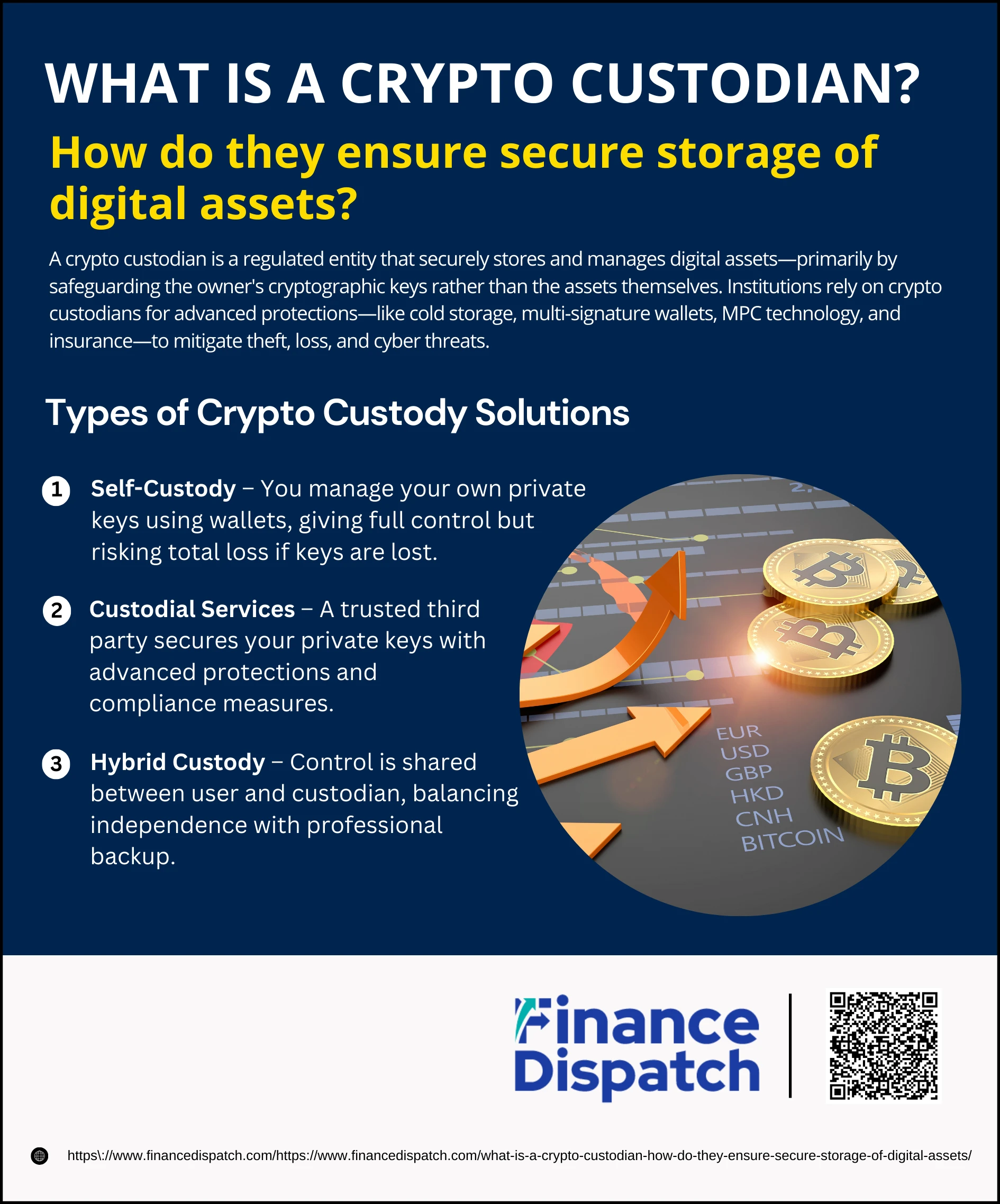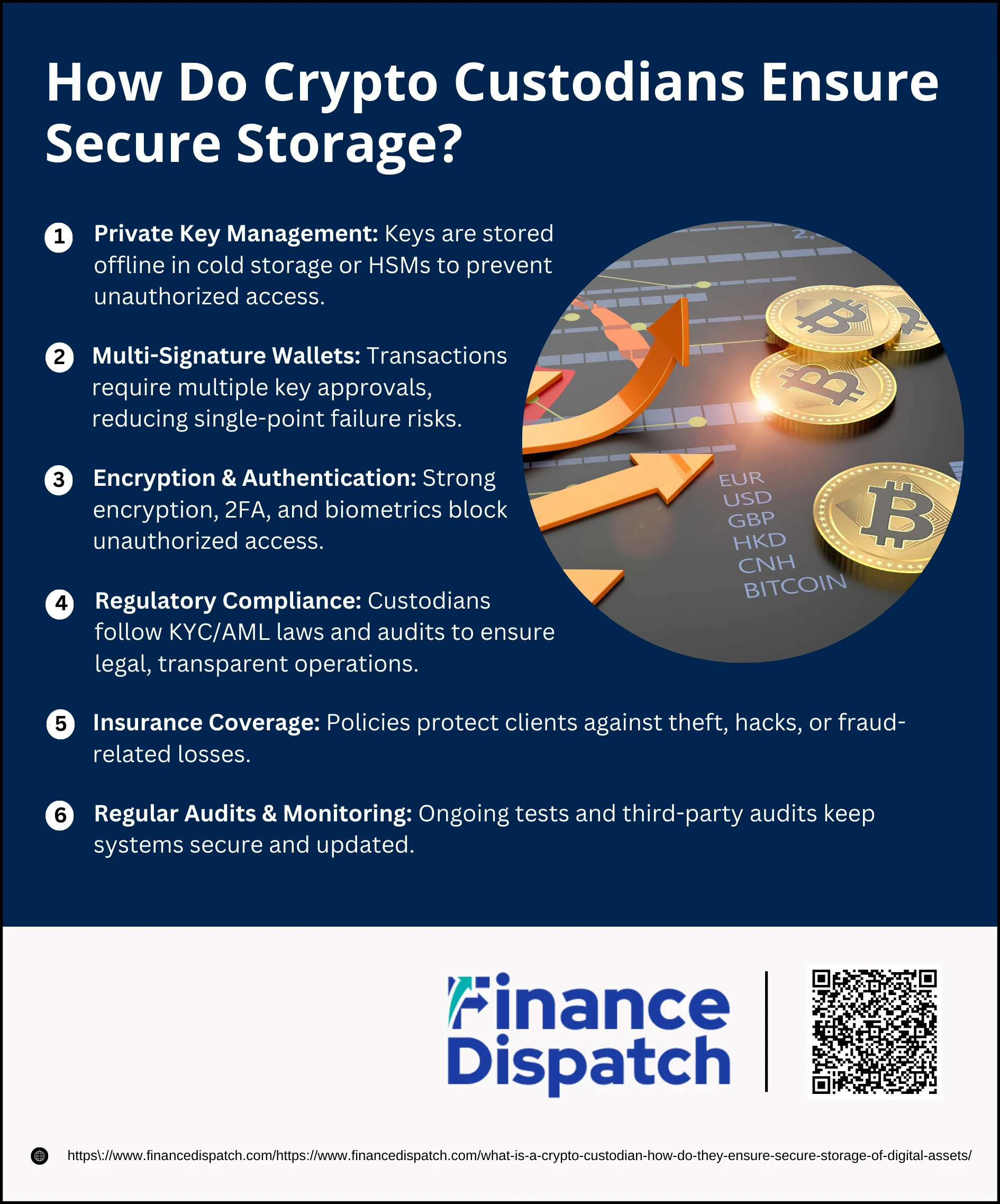In today’s fast-moving digital economy, cryptocurrencies like Bitcoin and Ethereum have become more than speculative assets — they are now part of mainstream investment portfolios for individuals, corporations, and even large institutions. But with this growth comes a critical challenge: how do you keep these digital assets safe in a world where a single misplaced key or a sophisticated hack can wipe out millions? This is where crypto custodians step in. Acting much like traditional custodians in finance but adapted for the blockchain era, they specialize in safeguarding private keys, ensuring compliance with regulations, and protecting investors against theft or loss. In this article, we’ll explore what a crypto custodian is and how they deploy advanced tools, from cold storage to multi-signature authentication, to provide secure storage of digital assets.
What is a Crypto Custodian?
A crypto custodian is a specialized financial institution or service provider that securely holds and manages digital assets on behalf of individuals, companies, or institutional investors. Instead of keeping your own private keys — the digital codes that grant access to your cryptocurrencies — you entrust them to a custodian who uses advanced security measures to protect them from theft, hacking, or accidental loss. Beyond simple storage, custodians often provide additional services such as insurance coverage, transaction management, and regulatory reporting, making them especially important for institutional investors who must meet strict compliance standards. In essence, a crypto custodian acts as a trusted guardian of your digital wealth, ensuring your assets remain safe, accessible, and legally protected.
Why Are Crypto Custodians Important?
Crypto custodians are important because they provide a secure and reliable way to protect digital assets in a market that is often targeted by hackers and plagued with risks of lost private keys. For individual investors, a custodian reduces the burden of managing complex security measures, while for institutions, it ensures compliance with strict regulatory requirements and safeguards client funds. They also offer insurance coverage, audit trails, and recovery options that self-custody simply cannot guarantee. In short, custodians add an essential layer of trust and security, making cryptocurrencies more accessible and practical for both everyday users and large organizations handling substantial portfolios.
 Types of Crypto Custody Solutions
Types of Crypto Custody Solutions
The way you store your cryptocurrency plays a huge role in how secure and accessible it will be. Different custody solutions exist to meet the needs of everyday users, businesses, and large institutions. Some options put you fully in control of your private keys, while others transfer responsibility to professional custodians with advanced security and regulatory safeguards. Here are the main types:
1. Self-Custody: In this model, you are your own bank. You hold your private keys using tools like hardware wallets (Ledger, Trezor) or software wallets (MetaMask, TrustWallet). While this gives you maximum independence and privacy, it also means that if you lose your keys or your device gets compromised, there is no backup—your funds could be gone forever.
2. Custodial Services: Here, a trusted third-party custodian (such as Coinbase Custody or BitGo) holds and manages your private keys for you. They use sophisticated security measures like cold storage, multi-signature wallets, and even insurance coverage to protect your assets. This solution is especially popular with institutions that must follow strict compliance rules, though it does require trusting the custodian’s infrastructure and policies.
3. Hybrid Custody: This approach combines the best of both worlds by splitting control between the investor and the custodian. For example, with multi-key or multi-signature setups, both parties may need to approve a transaction. Hybrid custody reduces the risk of a single point of failure, offering both user control and professional backup. It is ideal for investors who want extra safety but don’t want to rely entirely on a third party.
 How Do Crypto Custodians ensure secure storage of digital assets?
How Do Crypto Custodians ensure secure storage of digital assets?
Crypto custodians are trusted entities that specialize in protecting digital assets like Bitcoin, Ethereum, and other cryptocurrencies. Since ownership depends entirely on private keys, even a small mistake can lead to permanent loss. To solve this, custodians combine advanced technology, layered security systems, and compliance frameworks to ensure assets are both safe and accessible when needed. Here’s how they do it:
1. Private Key Management
Private keys are the backbone of cryptocurrency ownership, and losing them means losing access to your funds. Custodians protect these keys by using cold storage, where keys are kept offline and completely isolated from internet threats. Some also use Hardware Security Modules (HSMs), which are tamper-resistant devices designed to safeguard cryptographic keys. By storing keys in secure, offline vaults, custodians drastically reduce the chances of hacking or unauthorized access.
2. Multi-Signature Wallets
Instead of relying on a single key to approve transactions, custodians use multi-signature (multisig) wallets. This means multiple private keys are required to authorize a transfer. For example, a 2-of-3 setup may require approvals from two different parties before funds move. This system eliminates the risk of a single point of failure and adds extra layers of governance, especially useful for institutions handling large sums.
3. Encryption & Authentication
Strong encryption is used to secure sensitive data, ensuring that even if hackers intercept information, it remains unreadable. In addition, custodians enforce two-factor authentication (2FA), biometric verification, and sometimes even password-less logins. These methods confirm the identity of users before allowing access to accounts or transactions, making unauthorized entry extremely difficult.
4. Regulatory Compliance
Trust is critical in the crypto world. Custodians adhere to strict regulatory requirements such as Know Your Customer (KYC) and Anti-Money Laundering (AML) policies. Many also undergo independent audits and follow industry standards like SOC 2 Type II to prove operational integrity. For institutional clients, this compliance ensures that investments remain legal, transparent, and protected under financial law.
5. Insurance Coverage
Even with the best security systems, risks can never be fully eliminated. That’s why many custodians offer insurance policies covering losses due to theft, cyberattacks, or employee fraud. This provides clients with peace of mind, knowing that in the rare event of a breach, their assets may be reimbursed. Some leading custodians even partner with global insurers like Lloyd’s of London to provide multi-million-dollar coverage.
6. Regular Audits & Monitoring
Security isn’t a one-time setup; it requires ongoing vigilance. Custodians conduct regular penetration tests, real-time monitoring of transactions, and independent third-party audits. These checks help identify vulnerabilities early and maintain trust with clients. By continuously updating protocols and keeping pace with evolving threats, custodians ensure that digital assets remain safe in the long term.
Benefits and Risks of Using a Custodian
sing a crypto custodian can make managing digital assets safer and more convenient, especially for institutions and investors who handle large portfolios. These services offer advanced security, regulatory compliance, and insurance coverage that individuals often cannot achieve on their own. However, custodians also come with certain risks, such as centralization of control, reliance on a third party, and additional fees. Understanding both the advantages and challenges helps you make an informed decision about whether a custodian is right for you.
| Benefits | Risks/Challenges |
| Stronger Security – Advanced measures like cold storage, multisig, and encryption protect assets from hacks and theft. | Centralization Risk – Custodial control can go against crypto’s decentralized nature. |
| Insurance Coverage – Many custodians provide insurance against theft, fraud, or system breaches. | Custodian Insolvency – If the custodian fails financially, access to assets may be at risk. |
| Regulatory Compliance – Helps meet KYC/AML and audit requirements, especially for institutions. | Regulatory Ambiguity – Rules differ across regions, making compliance complex. |
| Convenience – Simplifies asset management by removing the need to secure private keys personally. | Fees – Custodians often charge custody, setup, or withdrawal fees. |
| Recovery Options – Custodians may assist with recovery if access credentials are lost. | Counterparty Risk – Users must trust that the custodian follows best practices. |
Leading Crypto Custodians in the Market
As the cryptocurrency industry matures, several trusted custodians have emerged to provide secure storage and management solutions for both individual and institutional investors. These companies combine advanced security protocols with regulatory compliance and insurance coverage, making them reliable partners for safeguarding digital wealth. Below are some of the most notable crypto custodians in the market today:
1. Coinbase Custody – Offers insured cold storage, regulatory compliance, and integration with Coinbase Prime for trading and asset management.
2. BitGo – Known for institutional-grade security, multi-signature wallets, and comprehensive insurance coverage.
3. Anchorage Digital – A regulated custodian providing custody, trading, and staking services under U.S. federal charter.
4. Fireblocks – Specializes in secure transfer and storage with Multi-Party Computation (MPC) technology for institutional clients.
5. Fidelity Digital Assets – Brings traditional financial expertise into crypto custody with insured storage, trading, and client support.
6. Gemini Custody – Provides multi-signature authentication, role-based governance, and insurance for digital assets.
How to Choose the Right Custodian
Selecting the right crypto custodian is one of the most important decisions for securing your digital assets. Since custodians vary in their services, security measures, and pricing, it’s essential to evaluate them carefully before trusting them with your funds. A good custodian not only provides strong protection but also ensures compliance, transparency, and long-term reliability. Here are the key factors to consider:
1. Security Infrastructure – Look for cold storage, multi-signature wallets, hardware security modules (HSMs), and real-time monitoring.
2. Regulatory Compliance – Ensure the custodian follows KYC, AML, and industry standards with proper licensing and oversight.
3. Insurance Coverage – Verify if digital assets are insured against theft, fraud, or employee misconduct.
4. Transparency and Audits – Choose custodians that provide independent third-party audits and clear proof-of-reserves reporting.
5. Reputation and Experience – A proven track record in both traditional finance and crypto custody adds trust.
6. Fee Structure – Compare custody fees, setup charges, and withdrawal costs to find a solution that fits your budget.
7. Accessibility and Integration – Consider user-friendly interfaces, trading integrations, and ease of withdrawals or transfers.
Conclusion
Crypto custodians have become an essential part of the digital asset ecosystem, bridging the gap between the decentralized nature of cryptocurrencies and the security, compliance, and trust that investors demand. By safeguarding private keys, providing insurance coverage, and adhering to strict regulatory standards, custodians make it possible for both individuals and institutions to participate in the crypto market with confidence. While they do introduce trade-offs such as fees and reliance on third parties, their role in protecting against theft, loss, and mismanagement cannot be overstated. Ultimately, choosing the right custodian comes down to balancing security, accessibility, and trust—ensuring your digital assets remain both safe and usable in the long run.



